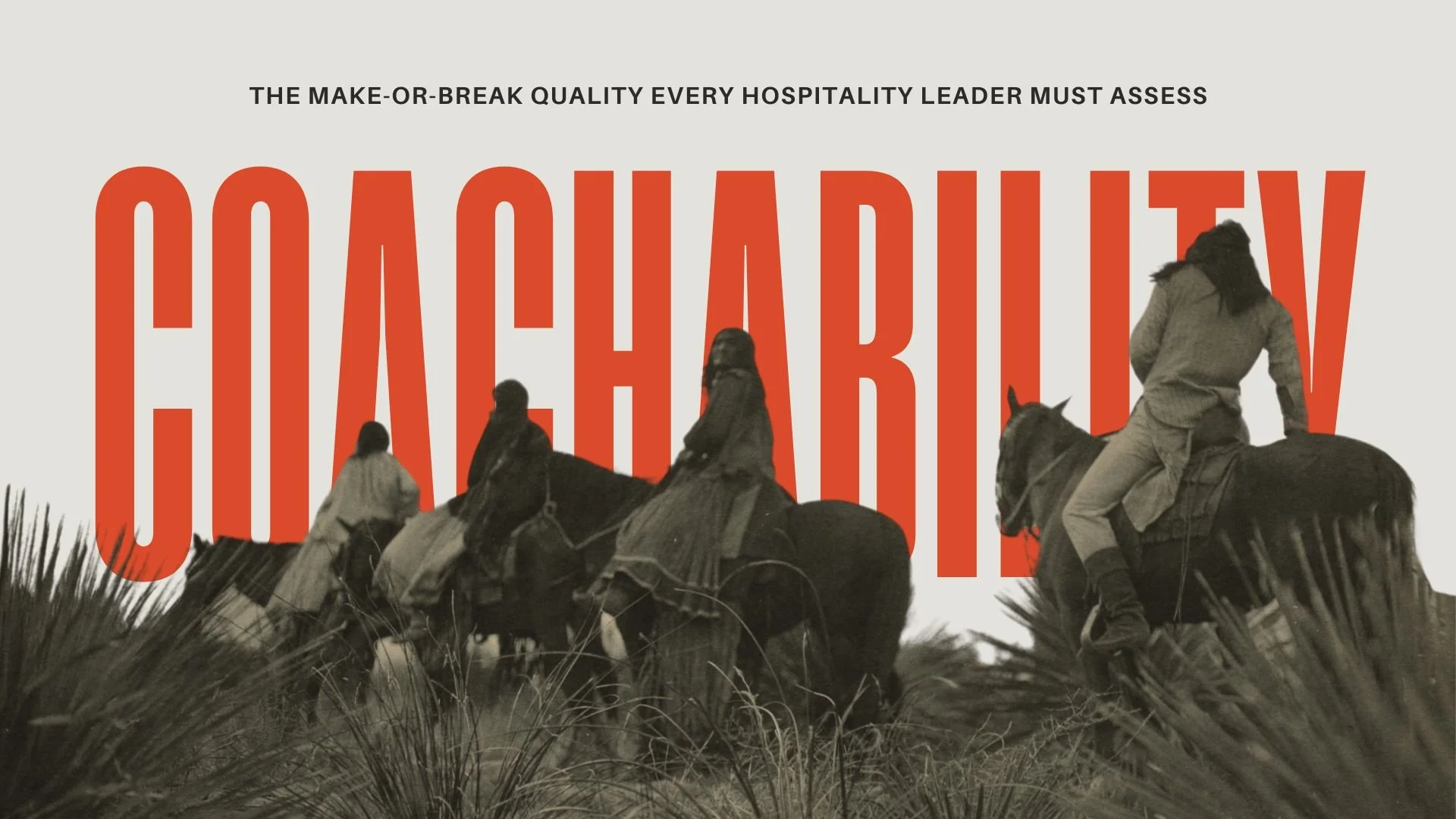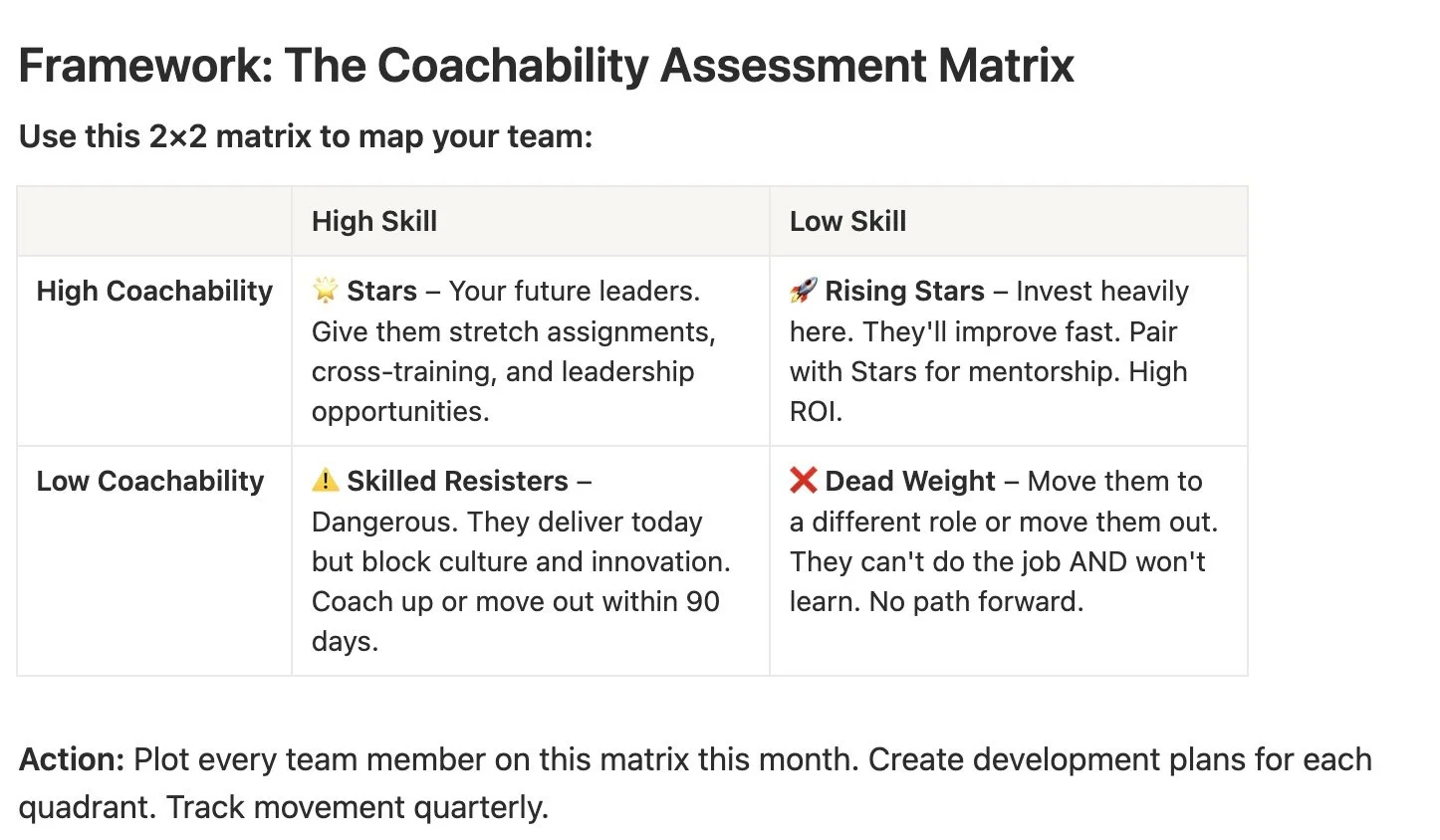Is Your Team Coachable? The Make-or-Break Quality Every Hospitality Leader Must Assess
The difference is always the people. The delta in growth / improvement is the COACHABILITY of the people.
"My best skill was that I was coachable. I was a sponge and aggressive to learn." — Michael Jordan.
Michael Jordan didn't say his best skill was his jump shot or his athleticism. He said it was being coachable.
Coachability is the willingness and ability to accept feedback, learn, and apply new skills for improvement. It's what separates teams that plateau from teams that dominate. It's the multiplier of talent, the engine of adaptability, and the foundation of exceptional guest experiences.
Yet most leaders never systematically assess it.
The 5 Observable Signs of a Coachable Team Member
Forget self-assessment surveys. Coachability isn't what people say about themselves—it's what they do when the pressure is on.
Here's how to spot it:
1. They Listen Without Defensiveness
When you give feedback mid-shift, do they listen attentively and ask clarifying questions? Or do they interrupt, make excuses, and deflect?
Coachable team members receive feedback as a gift, not an attack.
2. They Take Ownership of Mistakes
After a service mistake, do they take responsibility and suggest a fix? Or do they blame the kitchen, the guest, the system, or "being too busy"?
Accountability is the heartbeat of coachability.
3. They Adapt to Change
When you introduce a new SOP, menu item, or service standard, do they try it without resistance? Do they experiment, adjust, and refine?
Coachable team members lean into change, even when it's uncomfortable.
4. They Apply Feedback Quickly
After a coaching conversation or training session, can you see evidence of change in the next shift? Do they course-correct and improve?
Coachability without follow-through is just nodding. Real coachability shows up in behavior.
5. They Improve Over Time
Over weeks and months, do you see visible progress in their service, attitude, or teamwork?
Consistent growth is the ultimate proof of coachability.
A Simple Leader's Assessment Tool
You don't need a formal assessment to gauge coachability. You need observation and documentation. After your next round of feedback conversations, ask yourself these five questions for each team member:
Describe a recent situation where you gave this team member feedback. How did they respond, and what happened next?
Share an example of when this team member made a mistake. How did they take responsibility, and what actions did they take?
Recall a time when a new process was introduced. How did this team member adapt?
After a coaching session, what evidence have you seen that they applied what they learned?
Over the past month, what positive changes have you observed in their performance or attitude?
If you can answer these with concrete examples of growth and accountability, you have a coachable team member. If you're drawing blanks or noticing patterns of resistance, you have a coaching problem—or a performance problem.
We created a tool for you to use. Please remember these are experimental in nature and not fully functional apps. The data is stored locally in your browser. Use it to get a feel of what a systemised approach could look like. Interested in getting the full app for yourself, get in touch >
Your Action Plan: Starting Tomorrow
This week:
Pick three team members and observe their responses to feedback
Document one example for each of the five coachability signs
Identify your most and least coachable team members
This month:
Implement 90-second in-the-moment coaching during shifts
Share one mistake you made and how you're improving (model coachability)
Recognize one team member publicly for applying feedback and improving
This quarter:
Integrate coachability into your hiring criteria and interview questions
Create a simple leader's assessment form using the five prompts above
Have a direct conversation with your least coachable team member: coach them up or coach them out
The Bottom Line
In hospitality, the question isn't just "Is my team skilled?" It's "Is my team coachable?" Because skills become outdated. Guest expectations shift. Operations evolve.
But a coachable team? They adapt. They learn. They grow. They win.
Your guests don't experience your team's résumés. They experience your team's ability to listen, adapt, and deliver—shift after shift, guest after guest. Coachability is the difference between a team that survives and a team that thrives.
So ask yourself: Is your team coachable?
If you don't know the answer, it's time to find out.
Key Finding: Talent opens doors, but coachability keeps them open. Research shows coaching cultures deliver 7-20× ROI, with 22% higher engagement, 20-28% performance improvement, and 28% lower turnover.
Related Insights
The Skill/Will Matrix – Danny Meyer’s Secret for Managing a Team - Danny Meyer's framework complements coachability assessment; coachability lives at the intersection of skill development and will to improve.
Performance = Talent × Effort – Coachability multiplies both talent (through skill acquisition) and effort (through motivation to grow)
Building Go-To Persons – Coachable team members become your go-to people; they're the ones who absorb coaching and then coach others
Want us to assist? Reach out to Prabhjot Bedi, p.bedi@eclathospitality.com or +91 9872000604 for an absolutely free discussion. You can also visit prabhjotbedi.com to set up a time that suits you.



